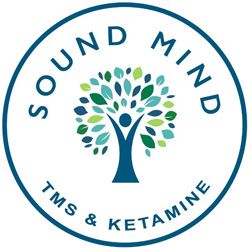Get in touch
1809 Dahlke Drive Cullman, AL, 35058
M-F 8AM-5PM, Saturdays by appointment only
210 Main Ave SW, Cullman, AL 35055
KETAMINE FOR BIPOLAR
FOR CULLMAN & NORTH ALABAMA
Sound Mind TMS & Ketamine Therapy is proud to offer the latest in mental health treatment options. In addition to high levels of safety standards and patient care, Sound Mind offers ketamine infusion therapy for the treatment of bipolar disorder as well as other mood disorders like depression, anxiety, and PTSD.
Ketamine infusion therapy has proven to be a rapid and robust treatment for bipolar disorder.
WHY KETAMINE?
Traditional bipolar disorder treatments often take weeks or even months to provide symptom relief. In contrast, ketamine infusion therapy is a fast-acting and effective option, offering relief within days—or even hours. Clinical studies show that 75% of patients report a positive response after a single treatment. However, since the effects may last only 3-5 days, a structured series of ketamine treatments over 2-3 weeks is recommended to extend the benefits.
By targeting neurotransmitter activity, ketamine therapy promotes neuroplasticity, helping regulate mood instability in individuals with bipolar disorder. With ongoing maintenance and booster infusions every 3-4 weeks, patients can achieve long-lasting symptom relief.
At Sound Mind TMS, we specialize in cutting-edge TMS therapy and ketamine treatments for mental health disorders, including bipolar disorder, depression, anxiety, and PTSD. If you’re seeking a breakthrough treatment for mood stabilization, contact us today to explore the benefits of ketamine for bipolar disorder.
HOW DOES KETAMINE HELP BIPOLAR DISORDER?
It is believed that treating bipolar disorder with ketamine produces an antidepressant effect by targeting the NMDA receptors inside the brain. By connecting to those receptors, ketamine is able to amplify the number of glutamate neurotransmitters in the space between neurons in the brain. This release of glutamate likewise beneficially modulates numerous other neurotransmitters as well as a large surge of beneficial Brain Neurotropic Factor.
WHAT IS BIPOLAR DISORDER?
Bipolar disorder, also referred to as bipolar depression or manic depression, is a mental health condition characterized by extreme mood swings of emotional highs (known as mania) and lows (known as depression).
You may experience feelings of sadness or hopelessness during periods of depression and may lose interest in your hobbies. When you experience periods of mania, or the less extreme form called hypomania, you may feel euphoric or energetic. These extreme mood swings affect sleep patterns, energy levels, behavior, and your ability to think clearly. Often, irresponsible decisions are made during times of mania.
These mood swings occur only a few times a year, but bipolar disorder is nevertheless a lifelong condition that cannot be “cured” in the traditional manner of speaking.
QUICK LINKS TO LEARN MORE
WHEN YOU SUFFER FROM DEPRESSION OR A NEUROLOGICAL DISORDER, YOU ARE NOT ALONE. YOU CAN GET HELP.

KETAMINE INFUSION CAN HELP WITH:
- Depression
- Anxiety
- PTSD
- Fibromyalgia

WHAT ARE THE TYPES OF BIPOLAR DISORDER?
There are a few different types of bipolar disorder, but all of them have common symptoms of manic and depressive episodes. It is important to verify which type you are suffering from because treatments vary between them.
Explore the Five Types Below
BIPOLAR I DISORDER – MANIA AND DEPRESSION
Bipolar I disorder is the most common form of bipolar disorder, and it is also the most severe. You must have had at least one manic episode, but most people with bipolar 1 disorder have also gone through at least one major depressive episode or stay depressed most of the time.
BIPOLAR II DISORDER – HYPOMANIA AND DEPRESSION
If you have bipolar II disorder, you will have recurring episodes of both major depression and hypomania (a less severe form of mania). If you ever go through a manic episode lasting at least 7 days, your diagnosis will then be changed to bipolar I disorder.
CYCLOTHYMIA – HYPOMANIA AND MILD DEPRESSION
This is a milder form of bipolar, where the mood swings are not severe enough to be classified as mania or major depression.
MANIC/HYPOMANIC EPISODES
Hypomania is a less severe form of mania, but they feature almost the same symptoms. Mania and hypomania both can lead to problems in your performance at work or in school or conflict in your personal relationships. In severe cases, mania can even trigger a break from reality, psychosis, and can require hospitalization for proper treatment. To be classified as a manic or hypomanic episode, you must have at least three of the following symptoms:
- Being abnormally energetic
- Increased agitation
- Euphoria
- Change in sleep patterns
- Unusual talkativeness
- Being easily distracted
- Poor decision-making
DEPRESSIVE EPISODES
Major depression comes in episodes with symptoms strong enough to make your everyday life exceedingly difficult. You may find it hard to keep up with your everyday responsibilities. The common symptoms of depressive episodes are:
- Feeling of sadness
- Feeling of emptiness
- Loss of interest in hobbies
- Changes in appetite
- Weight loss or weight gain
- Sleeping too much or too little
- Restlessness
- Fatigue
- Feelings of guilt and shame
- Difficulty concentrating
- Suicidal thoughts or actions
KETAMINE FOR BIPOLAR DEPRESSION
IF YOU OR A LOVED ONE IS SUFFERING FROM BIPOLAR DISORDER AND OTHER TREATMENTS HAVE FAILED TO PROVIDE RELIEF, KETAMINE THERAPY MAY BE AN OPTION TO CONSIDER.
CONTACT SOUND MIND TMS & KETAMINE THERAPY TODAY FOR A CONSULTATION.
READY TO GET STARTED?
Sound Mind TMS is all about restoring hope and renewing lives. If you reside in Cullman, Winston, Blount, Marshall, Morgan, Etowah, or the other surrounding counties in Northern Alabama, we can help.
GET HELP TODAY!
or call (256) 735-9475

QUICK LINKS
SCREENING
CONTACT US
210 Main Ave SW Cullman, AL 35055
M-T - 8am-5pm
W - 8-12pm
TH-F 8AM-5PM
Phone: (256) 735-9475
Fax: (256) 841-1429

All Rights Reserved | Sound Mind TMS




